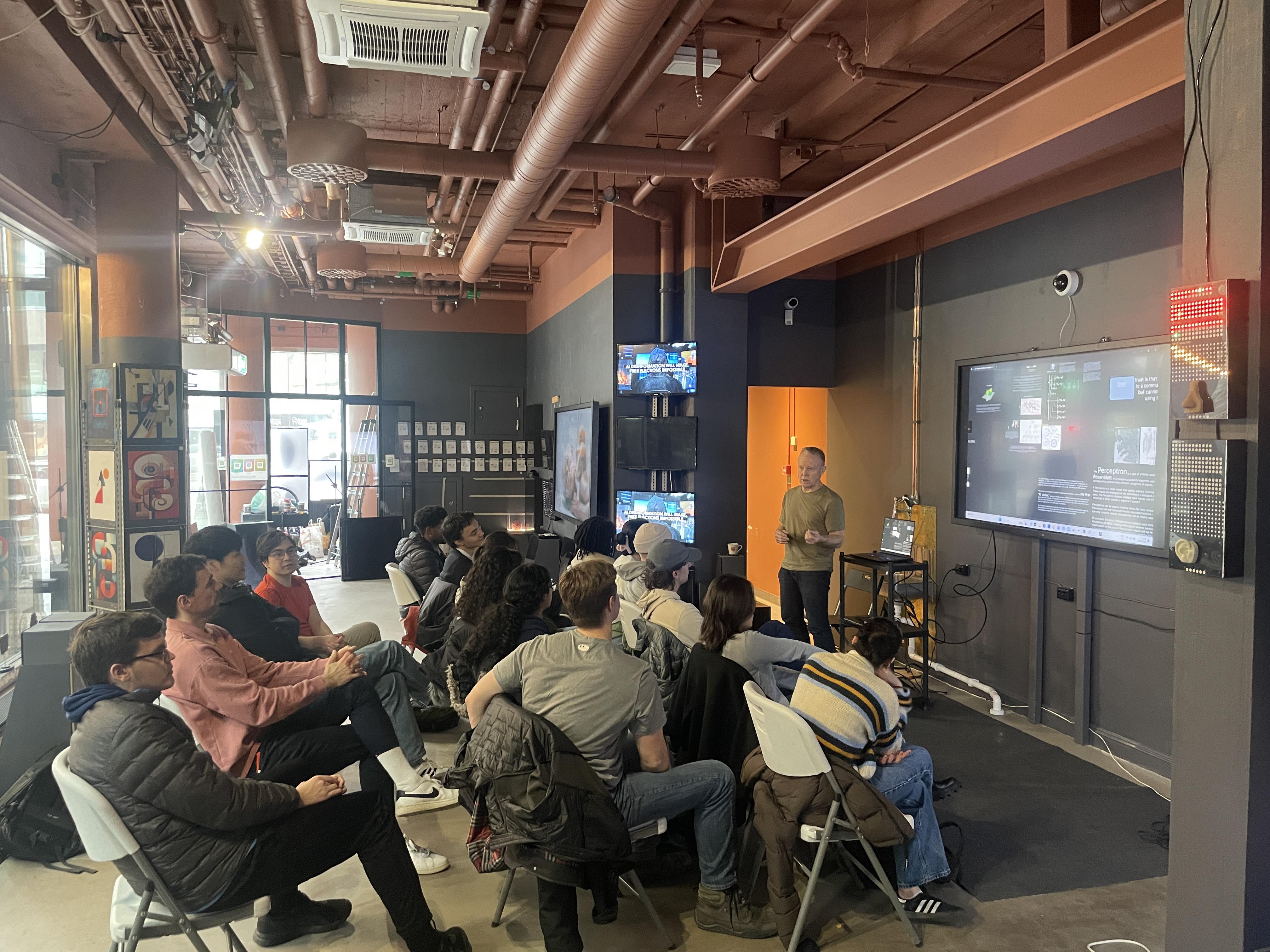Workshops - Seminars - Lectures
AI and the Future of Music, February 21
Augmentation, a concept developed by the IT pioneer Douglas Engelbart in the sixties, envisioned the use of computers in support of human intelligence and decision-making capabilities.
Now as AI threatens, or promises — pick your verb of choice, to fly past us in intelligence, decision-making, creativity and who knows what else, the tables
have turned. Now it is we who are expected to do the augmentation of AI. Or the control. Or perhaps, as some people maintain, pull its plug.
All of us who earn our living as creators, or simply take joy in creating for its own sake, need to ask the question: What's going on? Where do I fit in? What happens next?
And all of us who have appreciated and profited from human creativity, human invention and the technologies evolved by human civilization, also need to ask: What's going on? Where do I fit in? What happens next?
AI och Utbildning (in Swedish) April 11, 2024
Välkommen till ett seminarium om "AI och Lärande: Framtidens Utbildning". Vi bjuder in till ett utforskande samtal om hur artificiell intelligens förändrar hur, vad, när och var vi lär oss nya saker. Hur kan olika former av AI användas i olika lärandesammanhang, alltifrån skola, vuxenutbildning, universitet och kompetensförsörjning i arbetslivet? Vilka är de främsta riskerna? Vad är nya trender inom AI och hur kommer de att påverka vårt lärande och våra utbildningsinstitutioner?
Panelen: Annika Agéli Genlott, SKR Örjan Johansson, ATEA, ordf. i Swedish Edtech Industry Joakim Molander, Utbildningsdirektör - Academedia Cecilia Magnusson Sjöberg, Professor Stockholms Universitet Avid Fayaz Head of Education KTH AI Society Ann-Therese Enarsson, VD för tankesmedjan Futurion Moderator Jan Hylén Education Analytics AB
Programs in Swedish and English
Föreläsningar
En föreläsning tar 90 minuter inkl Q&A.
För skolklasser med upp till 40 deltagare är priset 2 500:-
För företag upp till 30 deltagare är priset 7 500:- (alternativt stödmedlemskap för företag i Museets ideella förening 5 000:-)
AW och andra kvällsaktiviteter prissätts efter överenskommelse.
Modul A) Historiken
En grundläggande resa i AI-historien:
Symbolist vs connectionist riktningar ⋅ Turing Test ⋅ Dartmouth Conference ⋅ Uppkomst av neural networks ⋅ Perceptron ⋅ Eliza ⋅ AI-vintrarna ⋅ ResNet ⋅ ImageNet ⋅ AlexNet ⋅ Transformers ⋅ De viktigaste händelserna fram till idag.
Modul B) Hands-on AI
Inventering och användning av dagens mest lovande AI-modeller:
Användning genom molnet eller på egen dator/mobil ⋅ Skillnaden mellan opensource- och proprietära modeller ⋅ Tillgång till AI-modeller genom API-nycklar ⋅ Effektiv prompting ⋅ Hur man bygger egen AI-chatbot ⋅ Introduktion till AI-agenter. (Deltagare följer med föreläsaren på egna mobiler eller laptops)
Modul C) Anatomi av AI:
Genomgång av de olika begrepp och beståndsdelar:
RNNs ⋅ CNNs ⋅ LSTMs ⋅ Diffusion ⋅ GANs ⋅ Transformers ⋅ State Space ⋅ Supervised och unsupervised learning ⋅ Pretraining ⋅ Fine-tuning ⋅ Backpropagation ⋅ Reinforcement Learning ⋅ Reinforcement Learning genom human feedback ⋅ Synthetic data ⋅ Data distillation ⋅ RAG ⋅ Mixture of Experts.
Modul D) AI och framtiden
Möjligheter och risker:
Vad är AGI? ⋅ Kommer AI att ta våra jobb? ⋅ Hur långt kan skalning ta oss? ⋅ Energiförbrukning ⋅ Monopolisering ⋅ Deep Fakes ⋅ AI som vapen ⋅ Reglering och lagstiftning ⋅
Lectures and workshops
Our programs are modular. The client has the opportunity to choose in advance which modules are suitable. You can choose, for example, A and B, or C and D, or A, C and D, or any combination that you think suits your needs and prior knowledge.
A lecture takes 90 minutes including Q&A.
For school classes with up to 40 participants, the price is SEK 2,500.
For companies with up to 30 participants, the price is SEK 7,500 (alternatively, a support membership for companies in the Museum's non-profit association SEK 5,000).
After-work and other evening activities are priced by agreement.
Module A) History
A fundamental journey through the history of AI:
Symbolist vs connectionist directions ⋅ Turing Test ⋅ Dartmouth Conference ⋅ Emergence of neural networks ⋅ Perceptron ⋅ Eliza ⋅ AI winters ⋅ ResNet ⋅ ImageNet ⋅ AlexNet ⋅ Transformers ⋅ The most important events to date.
Module B) Hands-on AI
Inventory and use of today's most promising AI models:
Use through the cloud or on your own computer/mobile ⋅ The difference between open-source and proprietary models ⋅ Access to AI models through API keys ⋅ Effective prompting ⋅ How to build your own AI chatbot ⋅ Introduction to AI agents. (Participants follow the lecturer on their own mobiles or laptops)
Module C) Anatomy of AI
Review of the different concepts and components:
RNNs ⋅ CNNs ⋅ LSTMs ⋅ Diffusion ⋅ GANs ⋅ Transformers ⋅ State Space ⋅ Supervised and unsupervised learning ⋅ Pretraining ⋅ Fine-tuning ⋅ Backpropagation ⋅ Reinforcement Learning ⋅ Reinforcement Learning through human feedback ⋅ Synthetic data ⋅ Data distillation ⋅ RAG ⋅ Mixture of Experts.
Module D) AI and the Future
Possibilities and risks:
What is AGI? ⋅ Will AI take our jobs? ⋅ How far can scaling take us? ⋅ Energy consumption ⋅ Monopolization ⋅ Deep Fakes ⋅ AI as a weapon ⋅ Regulation and legislation ⋅ DEI & ESG issues ⋅ Copyright and data integrity ⋅ Geopolitical factors ⋅ Security.
